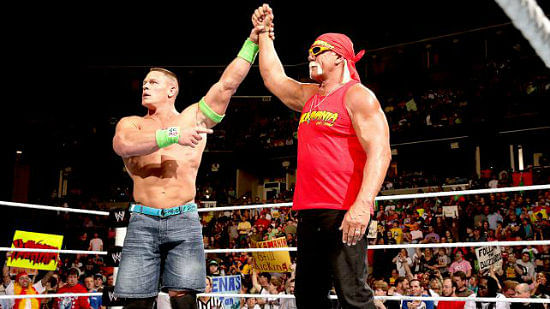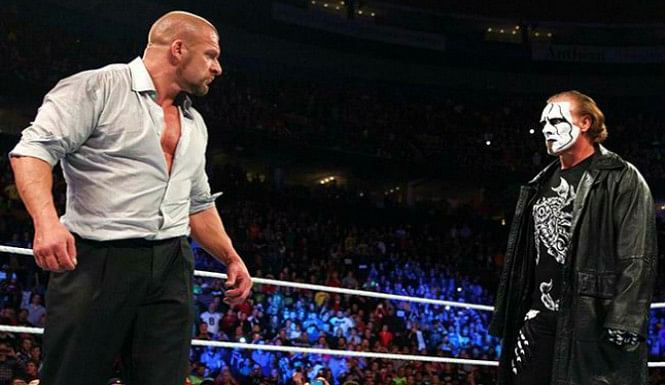TNA, circa 2010:

Following a brief, failed attempt by TNA to go head to head with WWE in 2010, the company made the decision that in order to get to the next level, they needed to take Impact! out of Universal Studios and into larger, conventional arenas. At a macro level this made sense - TNA would always seem minor league no matter how well dressed The Impact Zone was in comparison to WWE's tapings in full-sized basketball arenas with a mammoth TitanTron. It created a perception ceiling that TNA needed to break.
However TNA lost money in this endeavour, so much so that they were losing millions each month. TNA simply was not drawing enough people to the Impact tapings to cover the cost.

As a result the company began to shed talent as their liquid cash dried up, a process that continued all the way through 2016. As a result we have seen the following talent leave TNA, mostly due to low-ball contract offers extended by the company:
A.J. Styles
Samoa Joe
Frankie Kazarian
Jay Lethal
Brian Christopher
Bobby Roode
Austin Aries
Eric Young
Sting
Kurt Angle
Alex Shelley
Mickie James
Hulk Hogan
Kevin Nash
The Dudleys
Ric Flair
Meanwhile going into this decade there was a self-imposed embargo on going after TNA talent by the WWE. As TNA talent began to slowly depart, the immediate beneficiary was Ring of Honor. ROH quickly added Jay Lethal, Kazarian, Brian Christopher, and Alex Shelley. This helped to bring some star power to a promotion that was filled with a collection of non-descript generic wrestlers following the departures of Daniel Bryan, Caesaro, Sami Zayn, and Seth Rollins, coupled with their acquisition by Sinclair Broadcasting.
Meanwhile for WWE, it was a slower accrual of benefits. Kevin Nash was the first to return, appearing at the Royal Rumble in 2011. He would go on to face HHH in a TLC match at the end of the year and became involved in the CM Punk/HHH storyline that fall.

Ric Flair was next, returning in December 2012 as a non-wrestling personality. Eventually he would play a key role in the launch of Charlotte Flair as a heel champion in 2015.

Hulk Hogan would return in 2014 as a non-wrestling personality, and found himself in an elder-statesman role for the first time. He was to have been used in a WrestleMania tag match with John Cena, but could not pass his physical.

The Dudleys would return in 2015 with their old WWE gimmicks and would be primarily used to get current acts over. Perhaps the biggest impact was Sting. His contract having expired, Sting joined the WWE and the company was immediately able to use this to create a WrestleMania attraction. Unfortunately his neck injury sustained against Seth Rollins later that year ended further capitalization on his arrival.

For the homegrown TNA talents, the immediate impact was in NXT. Quickly the WWE's developmental roster received enhancements as Bobby Roode, Austin Aries, Eric Young, and Samoa Joe joined (James Storm also made an appearance but returned to TNA) in 2015 and 2016. This furthered a process that was taking place within NXT as the division shifted away from completely homegrown talent (ala Roman Reigns) and to wrestlers from outside the company (Dean Ambrose, Apollo Crews). Joe, Roode, Aries, and to an extent Young brought true star power as millions had seen them over the years on TNA Impact, as opposed to the more limited audience of ROH or the non-televised independents. Eventually both Roode and Aries joined the roster, and in July Samoa Joe will be headlining his first WWE PPV. Meanwhile Roode appears to be a likely player on the main roster in 2018.

Finally there is A.J. Styles. As a cornerstone of TNA he was brought directly to the main roster and by the end of his first year was World Heavyweight Champion. WWE was able to capitalize on his arrival with multiple main events. He remains a fixture of Smackdown's roster and is now a cornerstone here.

So focusing on the impact to WWE, it was has been substantial over the last two years and continues to remain so to this day. Had WWE been unable to tap into the now scattered TNA roster, it would be a somewhat different company today. In retrospect, it is almost like a slow motion version of the benefits that WWE accrued when World Championship Wrestling went out of business in 2001. Then there was an immediate influx of new talent to the roster, so much so that the company did not know what to do with it. Here it has been more gradual but just as impactful. WWE absorbed the heart of the roster of their closest competitor over the last five years. It was a shot in the arm for a company struggling to develop their own talent.

Following a brief, failed attempt by TNA to go head to head with WWE in 2010, the company made the decision that in order to get to the next level, they needed to take Impact! out of Universal Studios and into larger, conventional arenas. At a macro level this made sense - TNA would always seem minor league no matter how well dressed The Impact Zone was in comparison to WWE's tapings in full-sized basketball arenas with a mammoth TitanTron. It created a perception ceiling that TNA needed to break.
However TNA lost money in this endeavour, so much so that they were losing millions each month. TNA simply was not drawing enough people to the Impact tapings to cover the cost.

As a result the company began to shed talent as their liquid cash dried up, a process that continued all the way through 2016. As a result we have seen the following talent leave TNA, mostly due to low-ball contract offers extended by the company:
A.J. Styles
Samoa Joe
Frankie Kazarian
Jay Lethal
Brian Christopher
Bobby Roode
Austin Aries
Eric Young
Sting
Kurt Angle
Alex Shelley
Mickie James
Hulk Hogan
Kevin Nash
The Dudleys
Ric Flair
Meanwhile going into this decade there was a self-imposed embargo on going after TNA talent by the WWE. As TNA talent began to slowly depart, the immediate beneficiary was Ring of Honor. ROH quickly added Jay Lethal, Kazarian, Brian Christopher, and Alex Shelley. This helped to bring some star power to a promotion that was filled with a collection of non-descript generic wrestlers following the departures of Daniel Bryan, Caesaro, Sami Zayn, and Seth Rollins, coupled with their acquisition by Sinclair Broadcasting.
Meanwhile for WWE, it was a slower accrual of benefits. Kevin Nash was the first to return, appearing at the Royal Rumble in 2011. He would go on to face HHH in a TLC match at the end of the year and became involved in the CM Punk/HHH storyline that fall.

Ric Flair was next, returning in December 2012 as a non-wrestling personality. Eventually he would play a key role in the launch of Charlotte Flair as a heel champion in 2015.

Hulk Hogan would return in 2014 as a non-wrestling personality, and found himself in an elder-statesman role for the first time. He was to have been used in a WrestleMania tag match with John Cena, but could not pass his physical.

The Dudleys would return in 2015 with their old WWE gimmicks and would be primarily used to get current acts over. Perhaps the biggest impact was Sting. His contract having expired, Sting joined the WWE and the company was immediately able to use this to create a WrestleMania attraction. Unfortunately his neck injury sustained against Seth Rollins later that year ended further capitalization on his arrival.

For the homegrown TNA talents, the immediate impact was in NXT. Quickly the WWE's developmental roster received enhancements as Bobby Roode, Austin Aries, Eric Young, and Samoa Joe joined (James Storm also made an appearance but returned to TNA) in 2015 and 2016. This furthered a process that was taking place within NXT as the division shifted away from completely homegrown talent (ala Roman Reigns) and to wrestlers from outside the company (Dean Ambrose, Apollo Crews). Joe, Roode, Aries, and to an extent Young brought true star power as millions had seen them over the years on TNA Impact, as opposed to the more limited audience of ROH or the non-televised independents. Eventually both Roode and Aries joined the roster, and in July Samoa Joe will be headlining his first WWE PPV. Meanwhile Roode appears to be a likely player on the main roster in 2018.

Finally there is A.J. Styles. As a cornerstone of TNA he was brought directly to the main roster and by the end of his first year was World Heavyweight Champion. WWE was able to capitalize on his arrival with multiple main events. He remains a fixture of Smackdown's roster and is now a cornerstone here.

So focusing on the impact to WWE, it was has been substantial over the last two years and continues to remain so to this day. Had WWE been unable to tap into the now scattered TNA roster, it would be a somewhat different company today. In retrospect, it is almost like a slow motion version of the benefits that WWE accrued when World Championship Wrestling went out of business in 2001. Then there was an immediate influx of new talent to the roster, so much so that the company did not know what to do with it. Here it has been more gradual but just as impactful. WWE absorbed the heart of the roster of their closest competitor over the last five years. It was a shot in the arm for a company struggling to develop their own talent.


